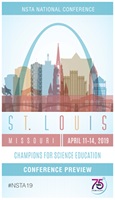Confluence of Equity and Education: Featured Strand at NSTA’s 2019 National Conference on Science Education in St. Louis, MO, April 11–14
By Carole Hayward
Posted on 2019-01-27
“Arguably, the most pressing challenge facing U.S. education is to provide all students with a fair opportunity to learn” (Framework; NRC 2012, p. 282). This challenge is of great importance as we continue to embrace changing demographics in our classrooms, communities, and country. Our imperative is to maintain high expectations and broaden access and opportunities in STEM education to increase the likelihood of student success and to prepare them to compete globally. — 2019 NSTA National Conference Committee
Science teachers from all over the country, and even the world, will gather for our national conference this spring. And we have a lot to celebrate, including our 75th anniversary. As part of the celebration, you’ll be seeing how much NSTA has changed over time, and a huge part of that change has been the inclusion of so many different types of science teachers, who are able to model for students that any one of us can be a scientist.
Conference organizers, with an eye toward advancing the best and most inclusive strategies for teaching science, offer a special strand “Confluence of Equity and Education” at our 2019 National Conference on Science Education, in St. Louis, April 11–14. Sessions organized around this strand include a featured presentation on Thursday, April 11, 3:30 to 4:30 PM (“Equity: The Power of Understanding the Impacts of Equity and Science Instruction”) by Joseph Davis, Superintendent, Ferguson-Florissant School District; and Tiffany Besse, Chief Academic Officer, Ferguson-Florissant School District. Davis and Besse will focus on the importance of serving all children with the high-quality education they deserve, particularly those who statistically are predicted to fail in the current model. Discussion centers on how partnering with NGSS-focused curriculum leads to equitable instruction in the science classroom and improvement in overall quality of education for students, teachers, and community. This strand will be targeted by level: novice, intermediate, or advanced attendees.
And there will be hundreds more sessions in St. Louis that focus on equity in science education; below is a small sampling:
- Equal Access to Science: Universal Design and Students with Disabilities
- STEP UP 4 Women: Bringing the Representation of Women in Physics to 50% with High School Interventions
- A Cancer Education Curriculum for Underserved Elementary Schoolchildren
- Meaningful Notebooking!
- Two Growth Mind-Set Activities to Help Motivate and Teach All Students Nature of Science
- Equity, Leadership, and Change
- Standards-Based Grading: Impact on Student Engagement in a Science Classroom
- STEM Teaching for Dummies: How to Build a STEM Kid Using Nothing but Who’s Already in Your Class
- Inviting All Students into the NGSS: Fostering Equitable Learning Communities Through Culturally Relevant Science Teaching
- Launching Your NGSS Unit: Focus on Equity and Access
- Providing Equitable Learning Experiences for ELLs in Science
- Counter Racism Science Pedagogy: Race, Racism, and Science Through History and into Our Classrooms
- Non-Scientists: The Forgotten Majority
- When Physics and Pop Culture Collide! Strategies for Engaging Assessment and Instruction
- SC-10: Equity Through STEM Education (ticket required)
- All Kids Have A Voice: Using Protocols and Other Activities in the Middle School Science Classroom to Build Equity
- Empowering Experiences for Girls in Computer Science
- Counteracting Implicit Bias in Science Classrooms
- Vocabulary Instruction for English Language Learners!
- Can You Hear Me Now? Doing Science with Students with Limited and Interrupted Education (SLIFE)
- Connecting Makerspaces to Speech and Occupational Therapy
- STEM, Language, and Learning
- Supporting All Students to Make Sense of Phenomena by Building All of Their Intellectual Resources
- CEREBROedu/BRAINedu: Education and Family Engagement Around Brain Health in Latinx Communities
Extend your exploration of equity beyond our borders and attend Global Initiatives Enhancing Science Education: An International Share-a-Thon and Poster Session on Friday, April 12, in Grand Ballroom D/E, Hyatt Regency St. Louis at the Arch. Join the organizers to hear about international initiatives and programs on diverse areas of science education, including formal elementary to college science education, best practices, novel content delivery, scientific literacy, policy standards, and informal education.
Check out more sessions and other events with the St. Louis Session Browser. Follow all our conference tweets using #NSTA19, and if you tweet, please feel free to tag us @NSTA so we see it!
Need help requesting funding or time off from your principal or supervisor? Download a letter of support and bring it with you.
And don’t forget, NSTA members save up to $90 off the price of registration. Not a member? Join here.
Future NSTA Conferences
2019 National Conference
St. Louis, April 11–14
2019 STEM Forum & Expo
San Francisco, July 24–26
The mission of NSTA is to promote excellence and innovation in science teaching and learning for all.
Follow NSTA
Disclaimer: The views expressed in this blog post are those of the author(s) and do not necessarily reflect the official position of the National Science Teaching Association (NSTA).



